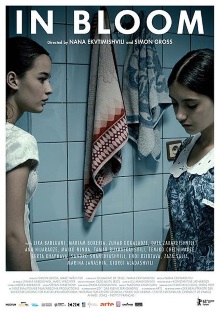
Small in scope and modestly budgeted, In Bloom nevertheless earned major plaudits both at home and abroad. Critics, rather grandiloquently in my opinion, have been heralding it as the first in a New Wave of Georgian cinema. That’s certainly enough to get my attention but I confess that I was rather more attracted by its exoticism, since I don’t think I’ve ever seen a Georgian film before.
Set in Tbilisi, Georgia in the 1990s, it tells the story of two schoolgirls who are best friends. Eka’s father is missing from her life and everyday as she walks home from school she humbly endures harassment from bullies. Natia lives with both of her parents but they argue and fight incessantly. Being the more beautiful of the two, Natia draws the attention of boys like honey attracts flies. She plays coy but seems to like a particularly good looking boy. Unfortunately the young head of a local street gang thinks she belongs to him and won’t take no for an answer.
In Bloom draws you in with what feels like a very authentic take on what Georgia must have been like then. Apparently plenty of elements were drawn from the life of writer and co-director Nana Ekvtimishvili, so much so that it can be considered semi-autobiographical. The buildings are visibly crumbling, a direct metaphor for the breakdown of society following the collapse of the Soviet Union. The children often run around with little adult supervision. The camera is impersonal and unintrusive, allowing us to be witnesses to what is going on but refrains from telling us what to think or how to feel.
Unfortunately this hands-off approach makes it difficult for those, including myself, who know little of recent Georgian history to understand the background behind the story. For example, why are the people so obviously desperate when queuing to buy bread, and just who are those armed men who go around and act as they please? We can still pick up on the emotional cues but probably only native Georgians will feel the full effect. I think it’s not too much of a spoiler to say that the plot is centered around bride kidnapping but again it’s not easy for outsiders to appreciate how prevalent it was or what society’s attitude towards it was like.
I do like to think of this as a particularly grim take on the coming-of-age genre. Eka and Natia are effectively forced to grow up quickly because their parents, the adults who are supposed to look out for them and take care of them, seem helpless and confused in the face of the rapid changes going on in Georgia. It is surreal how the adults all exhibit uninhibited joy during the wedding, while only Eka seems mindful that her friend might be less than perfectly happy. Even their teacher at school cruelly mocks them and in turn they seem to feel no obligation to show her any respect.
The young actresses who play the two lead characters, Lika Babluani and Mariam Bokeria, acquit themselves well. The camera work is impeccable, evoking a powerful sense of a distinct time and place. Unfortunately while the Georgian setting feels novel, too much of the plot and even the characters feel vaguely familiar. It is ultimately nothing that we haven’t seen elsewhere before. In short, a good film that is well worth watching and a credit to the country of Georgia, but far from a great one.